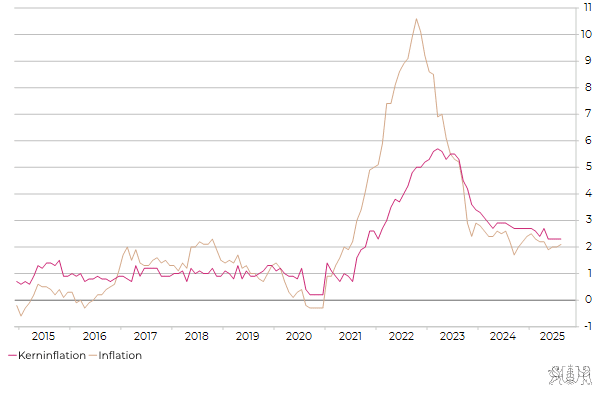- The European Central Bank (ECB) leaves key interest rates unchanged in September, as inflation is close to the ECB’s inflation target (2%). The deposit rate remains at 2.00%. The decision was unanimous.
- France’s high public debt and budget deficits are currently making headlines again. In an emergency, the ECB would be called upon to contain a new sovereign debt crisis. However, ECB President Christine Lagarde did not want to comment specifically on France at the press conference, but reassuringly mentioned that the ECB had not discussed the TPI (Transmission Protection Instrument) aid program at its meeting.
As expected, the ECB left key interest rates unchanged. The deposit rate therefore remains at 2.00%, the main refinancing rate at 2.15% and the marginal lending rate at 2.40%. The central bank saw no need to adjust its monetary policy stance in the current inflation environment. In August, the inflation rate rose slightly to 2.1%. Despite the increase, the inflation rate remains close to the ECB’s target of 2.0%. The ECB also expects the inflation environment to remain calm in the coming years. Its new projections show average inflation of 2.1% for 2025, 1.9% for 2026, and 1.8% for 2027. The ECB is slightly more optimistic about the economy for 2025, now expecting 1.2% instead of the previous 0.9%. The projection for 2026 is 1.0% and for 2027 1.3%.
During the press conference, ECB President Christine Lagarde listed a number of risks that the ECB is facing or could face. In this respect, the ECB will continue to refrain from pre-committing to an interest rate path and will instead decide on a meeting-by-meeting basis, as usual. Christine Lagarde responded to questions about France’s debt problem in an evasive and ultimately meaningless manner. She referred to the European fiscal rules, which are intended to contribute to the stabilization of public finances – knowing full well that the non-compliance with fiscal rules by countries such as France is a core problem of the European Monetary Union (EMU), which could force the ECB to take an active role in stabilizing the EMU. At least Christine Lagarde tried to spread optimism by pointing out that the TPI aid program had not been discussed at all during the ECB meeting.
The ECB’s next interest rate decision will take place on October 30. Currently, there are many indications that the ECB will not change key interest rates in October either.
While the European Central Bank found itself in a comfortable decision-making situation today, the US Federal Reserve will have to operate in a much more complicated environment at its meeting next Wednesday (September 17). While the economy and the labor market are showing signs of weakness, the inflation rate of around 3% is well above the Fed’s target of 2%. In addition, the Fed is under massive political pressure. Since Donald Trump’s chief economic advisor, Stephen Miran, will most likely already be attending the September meeting, the political pressure on the Fed is likely to be even more immediate now. Despite high inflation, an interest rate cut is considered a done deal, probably by 25 basis points.
Eurozone: Inflation and core inflation (yoy)

Source: Macrobond.
